 Petzlover
Petzlover Bohemian Shepherd is originated from Czech Republic but Welsh Corgi is originated from United Kingdom. Bohemian Shepherd may grow 26 cm / 11 inches higher than Welsh Corgi. Bohemian Shepherd may weigh 10 kg / 23 pounds more than Welsh Corgi. Bohemian Shepherd may live 3 years less than Welsh Corgi. Both Bohemian Shepherd and Welsh Corgi has almost same litter size. Bohemian Shepherd requires Moderate Maintenance. But Welsh Corgi requires High Maintenance
Bohemian Shepherd is originated from Czech Republic but Welsh Corgi is originated from United Kingdom. Bohemian Shepherd may grow 26 cm / 11 inches higher than Welsh Corgi. Bohemian Shepherd may weigh 10 kg / 23 pounds more than Welsh Corgi. Bohemian Shepherd may live 3 years less than Welsh Corgi. Both Bohemian Shepherd and Welsh Corgi has almost same litter size. Bohemian Shepherd requires Moderate Maintenance. But Welsh Corgi requires High Maintenance
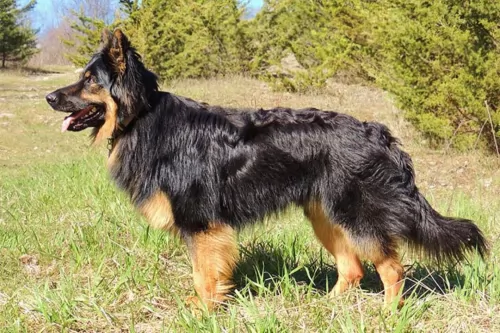 Known as the Chodský pes or the Chodenhund, the Bohemian Shepherd is native to the Czech Republic and is a herding breed. Like many other old dog breeds, nothing is 100% certain about is history. This is thought to be because the breed was developed centuries before the keeping of records. It is certain however, that the breed developed in the south-western portion of the Kingdom of Bohemia, which is now part of the Czech Republic.
Known as the Chodský pes or the Chodenhund, the Bohemian Shepherd is native to the Czech Republic and is a herding breed. Like many other old dog breeds, nothing is 100% certain about is history. This is thought to be because the breed was developed centuries before the keeping of records. It is certain however, that the breed developed in the south-western portion of the Kingdom of Bohemia, which is now part of the Czech Republic.
It is believed the Bohemian Shepherd came from herding dogs such as the Pinscher/Schnauzer, Spitzen or even a dog/wolf hybrid. It was in November 1991, that the Bohemian Shepherd Lover’s Club was founded. Many Bohemian Shepherd breeders have been registered and today the breed has earned the reputation for being a superb family dog. The dog has also been granted recognition with the Czech National Kennel Club.
 The Pembroke Welsh Corgi and the Cardigan Welsh Corgi were once considered to be two types of the same breed. Today they are recognized as very different breeds, but cousins of sorts.. They are alike in many ways and very different in others. The general information in terms of height and weight above applies to the more popular and better known Pembroke Welsh Corgi, developed as a herding dog from the spitz line in Pembroke shire, Wales. The Pembroke is famous for being the breed favored since childhood by Queen Elizabeth, the current queen of England. It’s believed that the Pembroke came to the country around the 10th century with Flemish weavers. The Cardigan is thought to have come with the Norse people and be a relative of the Sedish Vallhund.
The Pembroke Welsh Corgi and the Cardigan Welsh Corgi were once considered to be two types of the same breed. Today they are recognized as very different breeds, but cousins of sorts.. They are alike in many ways and very different in others. The general information in terms of height and weight above applies to the more popular and better known Pembroke Welsh Corgi, developed as a herding dog from the spitz line in Pembroke shire, Wales. The Pembroke is famous for being the breed favored since childhood by Queen Elizabeth, the current queen of England. It’s believed that the Pembroke came to the country around the 10th century with Flemish weavers. The Cardigan is thought to have come with the Norse people and be a relative of the Sedish Vallhund.
The Cardigan Welsh Corgi, also a herding dog has their ancestry in ancient Celtic dogs. They are older than the Pembroke and hail from Cardiganshire, Wales.
Both breeds are friendly, smart and independent. Both dogs herd cattle and sheep. About the end of the 19th century, farmers in Cardiganshire began to raising sheep rather than cattle. The corgis were herding dogs for cattle. “Heelers” who avoid the cattle kicking them by nipping at the cattle’s heel. Pembrokeshore and Cardiganshire are counties in South West Wales that adjoin each other.
Then the move was made from cattle to sheep in Cardiganshire they bred their corgis with the Welsh Sheepdog where the merle color is said to come from, and the Pembroke Welsh Corgi. This caused the similarities between the two dwarf breeds. At the same time the distance grew between the two breeds and they grew into very distinct and different looking dogs. There are also some differences in their personalities.
The first corgi to appear at Crufts came in 1927 and in 1928 a Pembroke won a championship at Cardiff for the first ever corgi win. It was not until 1934 that the kennel club recognized them as separate breeds rather than a Pembroke shire type and a Cardiganshire type. From this point on the two are separate breeds with tremendous similarities. A Pem won the Reserve Best in Show at Crufts in 1955.
The first corgi came to the United States in 1933 by a breeder of Old English Sheepdogs. In 1934 the American Kennel Club (AKC) recognized Corgis as one breed with 2 types. The Pembroke has always been the more popular of the two.
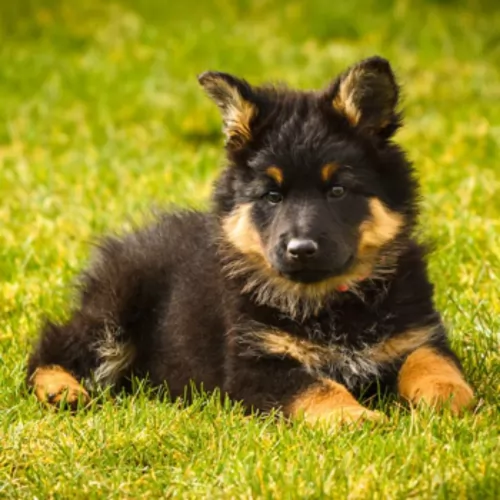 The medium sized Bohemian Shepherd looks much like a combination between the Collie and German Shepherd. He is 48-55 cm in height and weighs about 15-25 kg. The Bohemian Shepherd has a thick, long coat which is black and tan in color and with an undercoat, allowing him to cope in icy weather conditions. His well proportioned body is muscular and compact with a long bushy tail and erect ears.
The medium sized Bohemian Shepherd looks much like a combination between the Collie and German Shepherd. He is 48-55 cm in height and weighs about 15-25 kg. The Bohemian Shepherd has a thick, long coat which is black and tan in color and with an undercoat, allowing him to cope in icy weather conditions. His well proportioned body is muscular and compact with a long bushy tail and erect ears.
The Bohemian Shepherd makes a wonderful family pet, becoming very attached to his human family. He has a good reputation with children too and will get on well with other pets in the home. He is so amicable that he makes a good pet choice for those looking to own a dog for the first time.
He is intelligent and alert and also protective of his family, making him an excellent guard dog. He is easily trainable, and just like with any other dogs, will require training and socialization.
 They used to differentiate between the Cardigan and the Pembroke by saying the Cardigan was the one with the bigger ears and the Pembroke had no tail. In many parts of the world where tail docking has been banned, most Pembrokes now have tails. Only those born without don’t have them. Both dogs are long and low to the ground with big chests and short legs. This is because they are dwarfs. They are not little dogs.
They used to differentiate between the Cardigan and the Pembroke by saying the Cardigan was the one with the bigger ears and the Pembroke had no tail. In many parts of the world where tail docking has been banned, most Pembrokes now have tails. Only those born without don’t have them. Both dogs are long and low to the ground with big chests and short legs. This is because they are dwarfs. They are not little dogs.
The Cardigan Welsh Corgi is heavier boned than the Pembroke, has large rounded ears and a flowing, fox like tail. The Cardigan comes in a variety of colors but never predominately white. He is double coated with a dense, harsh outer and a soft, short and thick undercoat.
Pembroke is smaller and longer than the Cardigan with pointed ears. They are intelligent, sturdy and strong with tremendous stamina. The tail is docked in the United States or the pups are bred not to have a tail. This was originally so that the cattle could not step on their tails and injure the dogs. The double coat on the Pembroke is short and weather resistant inner coat with a longer and rougher outercoat. He has the same deep dropped chest as the Cardigan. Both corgis shed voraciously.
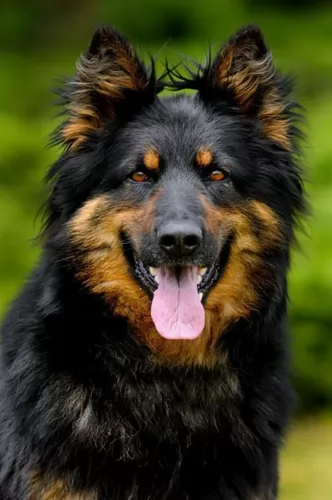 Playful by nature, friendly, gentle and co-operative, your Bohemian Shepherd will make a wonderful pet and he is a real social character, loving to spend lots of time with his human family. With minimal health conditions and without requiring much maintenance, he is an adaptable dog and will easily settle into city- or country living, so long as he is given regular exercise and attention.
Playful by nature, friendly, gentle and co-operative, your Bohemian Shepherd will make a wonderful pet and he is a real social character, loving to spend lots of time with his human family. With minimal health conditions and without requiring much maintenance, he is an adaptable dog and will easily settle into city- or country living, so long as he is given regular exercise and attention.
He is courageous and intelligent and also makes an excellent guard-dog. With so much going for this beautiful dog, he simply makes a loyal, loving and devoted family pet.
 1Children friendliness For the most part they are good but can be grumpy and bossy. They are bossy personalities
1Children friendliness For the most part they are good but can be grumpy and bossy. They are bossy personalities
3.Adaptability – Very. Can live anywhere but they do need to run and they bark a lot.
4.Learning ability – incredibly smart but stubborn. Respond well to training that is reward based.
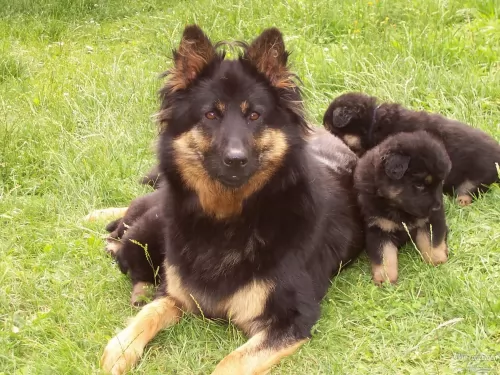 Breeding organizations are continually trying to minimize the diseases within limited-gene-pool dog breeds. While the Bohemian Shepherd is a generally health breed, there are diseases that are more common with the Bohemian Shepherd and which you need to be aware of -
Breeding organizations are continually trying to minimize the diseases within limited-gene-pool dog breeds. While the Bohemian Shepherd is a generally health breed, there are diseases that are more common with the Bohemian Shepherd and which you need to be aware of -
This is a painful disease – a problem with the formation of the hips – where the dog can develop arthritis and even become lame.
This is a condition where gas gets trapped in the stomach of your pet, so that he swells up, sometimes causing the stomach to twist. This is an emergency for your pet and it is extremely painful. Nobody really knows the cause, but when the gas is trapped inside the stomach, the bloated stomach of your pet requires you getting to the vet as quickly as you can.
Look out for Progressive Retinal Atrophy known as PRA . This is a group of degenerative diseases that affect the photoreceptor cells where the cells deteriorate and can result in blindness with your pet. Fortunately it isn’t a painful condition.
 • Degenerative Myelopathy – a muscular neurological disease very similar to Lou Gehrig’s Disease or ALS. It is always fatal.
• Degenerative Myelopathy – a muscular neurological disease very similar to Lou Gehrig’s Disease or ALS. It is always fatal.
• Some have cardiac issues while others may have hip dysplasia or Von Willebrand’s disease.
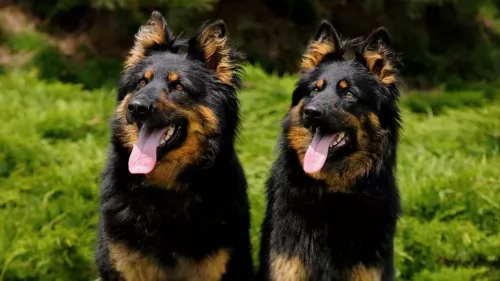 The Bohemian Shepherd is an energetic breed and will need to be exercised regularly. He’ll love to run alongside your bike on your cycling trips or you can take him on a long walk. Having said that, he is an easy going dog and can adapt to city- and country life, but if it’s city life, you can’t leave him cooped up in a small yard and think that will suffice. He has a personality that longs to be part of the family.
The Bohemian Shepherd is an energetic breed and will need to be exercised regularly. He’ll love to run alongside your bike on your cycling trips or you can take him on a long walk. Having said that, he is an easy going dog and can adapt to city- and country life, but if it’s city life, you can’t leave him cooped up in a small yard and think that will suffice. He has a personality that longs to be part of the family.
Your Bohemian Shepherd is a moderate shedder in spite of his thick beautiful coat. The coat will certainly need a good brushing at least twice a week to get rid of that loose hair. Not only that, your social Bohemian Shepherd will love the closeness to you that the brushing brings.
Keep his nails short and his teeth brushed at least 2 or 3 times a week to ensure there is no plaque build up. There are special toothbrushes and toothpastes made for dogs. Don’t use human toothpaste as the ingredients will be harmful to your pet.
Your Bohemian Shepherd, after one year of age, will eat one or two bowls of food a day. You’ll be able to tell what suits your dog, because the amount will eat about 2 to 4 cups of a good quality dry dog food a day, split into at least two meals. The amount can vary depending on its health, build, age, activity level and metabolism. Make sure it has access to water at all times and that it is changed as often as possible.
 1Feeding the puppy prone to overweight, the pem needs ½ to 1 cup of small breed high quality food in 3-4 meals per day. The Cardigan needs ¾ to 1 ¼ cups of high quality small breed food in 3-4 meals per day.
1Feeding the puppy prone to overweight, the pem needs ½ to 1 cup of small breed high quality food in 3-4 meals per day. The Cardigan needs ¾ to 1 ¼ cups of high quality small breed food in 3-4 meals per day.
2.Feeding the adult – Don’t overfeed them. The Pem need 1 cup per day of high quality small breed food in 2 meals per day. The Cardigan needs 1-1 ½ cups per day in one to two meals.
They are fast, athletic dogs. Agility, CAT, Barnhunt. Herding trials, flyball and they just love backyard ball fetching. Confirmation and obedience, along with rally.